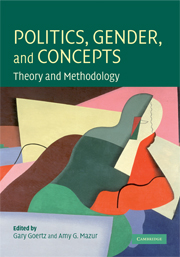Book contents
- Frontmatter
- Contents
- List of figures
- List of tables
- Notes on contributors
- Acknowledgments
- 1 Introduction
- 2 Mapping gender and politics concepts: ten guidelines
- Part I Gendering Concepts
- Part II Gender-Specific Concepts
- 8 Gender ideology: masculinism and feminalism
- 9 Intersectionality
- 10 Women's movements, feminism, and feminist movements
- 11 State feminism
- Appendix: A website for additional gender and politics concepts
- References
- Index
8 - Gender ideology: masculinism and feminalism
Published online by Cambridge University Press: 06 July 2010
- Frontmatter
- Contents
- List of figures
- List of tables
- Notes on contributors
- Acknowledgments
- 1 Introduction
- 2 Mapping gender and politics concepts: ten guidelines
- Part I Gendering Concepts
- Part II Gender-Specific Concepts
- 8 Gender ideology: masculinism and feminalism
- 9 Intersectionality
- 10 Women's movements, feminism, and feminist movements
- 11 State feminism
- Appendix: A website for additional gender and politics concepts
- References
- Index
Summary
Gender ideology is a concept often used, but seldom interrogated. In distinct contrast to other concepts such as gender identity, its use is so off-hand that it seldom rates an index entry in books related to any topic on gender, feminism, or women, although hegemonic masculinity – a concept that clearly suggests ideology – often is indexed. One suspects the definitional flexibility and multiple meanings associated with ideology more generally to be the source of both its common use and conceptual disregard. In “terminology reshuffling” (Gerring 1997: 960), gender ideology often is used synonymously with concepts such as gender attitudes, gender norms, gender power, gender relations, gender structures, and gender dynamics. It also appears in discussions of feminism, especially when feminism challenges cultural tradition or patriarchal dominance. A quick electronic search of the phrase “gender ideology” from 1980 to 2007 yielded 5,170 results. A nonsystematic examination of random pages from this search suggests that these articles overwhelmingly are concerned either with Bem sex-typing of traits and various psychological attitudes toward gender or with gender roles related to marriage, family, or household arrangements. Similar to the Poole-Rosenthal treatment of the liberal-conservative “political ideology” scale, some studies scaled gender ideology from traditional to egalitarian. Most of the 5,170 studies emanated from sociology or psychology, although anthropology also yielded a strong presence, analyzing the gender ideology underpinning norms for gender roles found in various world cultures.
- Type
- Chapter
- Information
- Politics, Gender, and ConceptsTheory and Methodology, pp. 159 - 192Publisher: Cambridge University PressPrint publication year: 2008
- 18
- Cited by



